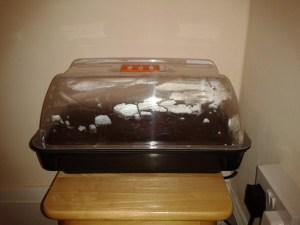It was back in November when I last posted about my chilli growing endeavours. Since then the cold weather and lack of light has meant no chilli growing until the shortest day had past and spring could be seen in our sights. Which happens to be right about now.
In the Beginning of the Season there was February
Now I’ve got to start today’s post by making a confession. I had received a wonderful selection of chilli pods last year by a fellow Twitter chilli grower. He kindly sent them to me so I could remove the seeds and grow them for this year.
Unfortunately I did the de-seeding in two batches and for some odd reason (probably because I wasn’t being organised at the time), I put one half of the seeds away in my normal seed boxes but I have no idea what I’ve done with the other half.
I could kick myself because you just know don’t you – I’ll have sown all my chilli seeds and then, only then, will they turn up – out of the blue when I move something or open a drawer.
I’ve searched high and low but can’t find them anywhere so feel pretty sad about that because they were all new varieties I hadn’t grown before.
So that leaves me with a couple of new varieties and I’ve decided to see if any of the seeds I’ve kept all the way back from 2011 will germinate.
Heating Things Up
Using the propagator I bought last year (which I’m still not convinced works properly), I have sown 7 types of the following varieties:
- Prairie Fire
- Naga Jolokia
- Cayenne
- Paper Lantern
- 7 Pot Yellow
- Trinity
- Devils Brew
Because I want to make sure the heat is as evenly distributed I’ve sown just 7 seeds for each variety making it a total of 49 seeds sown.

It doesn’t look all that exciting at the moment!
Growing medium
I’ve decided to try something altogether different this year (because I like to keep experimenting). I’ve used 100% peat free potting compost in the form of coconut coir.
It came as a solid block, through the post, which weighed less than a few grams. I filled the packet it came in, with water, and within 20 minutes the block expanded into 10 litres of fresh compost, nutrients included. I was actually very pleased with it. It felt crumbly and very easy to then add to the propagator. In fact I’m only sorry you can’t buy bigger packs. Of course I don’t know at the point how well the seeds will germinate in this kind of sowing material but if it’s anything like the coir pellets I’ve used in the past then I’d hope at least 50% of the seeds to germinate.
As soon as these appear I’ll get right ahead and start on the second batch, although depending on how long this set take to germinate (some chilli seeds can take up to a month), it may have warmed up enough by then to just sow without the heated propagator, on a windowsill.
I’m very excited to begin growing chillies again. This year I hope to accomplish two things:
- Get as many pods from each plant as possible for preserving and cooking with. I’ve seen how the Dorset Naga is, and while I might not get to those giddy heights of pod numbers, I can at least learn from them.
- Experiment creating my own hot sauce using the naga jolokia pods. I really like the hot sauce you can buy in jars. Some have the word ‘pain’ in their title, while others have words like ‘hurt’ in them. Most sauces I eat tend to have habanero’s as the main ingredient, and that’s hot in itself but what if I used a naga? Might well be interesting!
If you’re growing chillies this year share below what varieties you’ve sown/about to sow and we can compare growing stories along the way

_________________________
Cover photo courtesy of Xaimex
